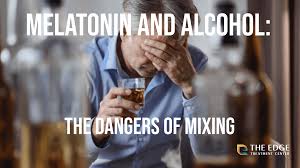The Relationship Between Melatonin and Alcohol
Melatonin is a hormone produced by the pineal gland in the brain that regulates the sleep-wake cycle. It plays a crucial role in signaling to your body when it’s time to sleep and wake up. Many people take melatonin supplements to help with sleep disorders or jet lag, as it can aid in falling asleep faster and improving overall sleep quality.
On the other hand, alcohol is a depressant that affects the central nervous system. While it may initially make you feel relaxed and sleepy, alcohol can disrupt your natural sleep patterns and interfere with the production of melatonin.
Research has shown that alcohol consumption can suppress the production of melatonin, leading to disrupted sleep cycles and poor sleep quality. This can result in difficulty falling asleep, frequent awakenings during the night, and overall reduced restorative sleep.
Furthermore, combining melatonin supplements with alcohol is not recommended as it can exacerbate these negative effects. The interaction between melatonin and alcohol can intensify drowsiness, impair cognitive function, and increase the risk of accidents or injuries.
If you are struggling with sleep issues and considering taking melatonin supplements, it’s important to be mindful of your alcohol consumption. Limiting or avoiding alcohol intake close to bedtime can help support your body’s natural production of melatonin and improve your chances of getting a good night’s rest.
Ultimately, maintaining healthy sleep habits, such as establishing a consistent bedtime routine, creating a relaxing sleep environment, and avoiding stimulants like alcohol before bed, is key to promoting restful sleep and overall well-being.
Exploring the Benefits of Melatonin and Alcohol: Enhancing Sleep and Relaxation
- Melatonin can help regulate the sleep-wake cycle.
- Alcohol may initially induce relaxation and drowsiness.
- Melatonin supplements can aid in falling asleep faster.
- Alcohol consumption can make some individuals feel sleepy.
- Melatonin may improve overall sleep quality.
- Alcohol can temporarily reduce anxiety and stress levels.
- Combining melatonin with alcohol may intensify feelings of relaxation.
5 Reasons to Avoid Mixing Melatonin and Alcohol for Better Sleep
- Alcohol consumption can suppress the production of melatonin, disrupting sleep cycles.
- Combining melatonin supplements with alcohol can intensify drowsiness and impair cognitive function.
- Alcohol interferes with the body’s natural sleep-wake cycle, leading to poor sleep quality.
- The interaction between melatonin and alcohol can increase the risk of accidents or injuries due to impaired coordination.
- Excessive alcohol intake close to bedtime can negate the potential benefits of melatonin supplements for improving sleep.
Melatonin can help regulate the sleep-wake cycle.
Melatonin plays a crucial role in regulating the sleep-wake cycle, also known as the circadian rhythm. By taking melatonin supplements, individuals can effectively signal to their bodies when it is time to sleep and wake up. This natural hormone helps synchronize the body’s internal clock with external cues, such as light and darkness, promoting a more consistent and restful sleep pattern. When used appropriately, melatonin can be a valuable tool in managing sleep disorders, jet lag, and other conditions that disrupt the body’s natural sleep cycle.
Alcohol may initially induce relaxation and drowsiness.
Alcohol may initially induce relaxation and drowsiness, making it a common choice for individuals seeking to unwind or alleviate stress. The sedative effects of alcohol can create a sense of calmness and ease tension, providing temporary relief from the demands of daily life. However, it is important to note that while alcohol may promote feelings of relaxation in the short term, its impact on overall sleep quality and the body’s natural production of melatonin can lead to disrupted sleep patterns and potential long-term consequences.
Melatonin supplements can aid in falling asleep faster.
Melatonin supplements have been shown to be beneficial in helping individuals fall asleep faster. By taking melatonin, the hormone responsible for regulating the sleep-wake cycle, individuals can experience an improvement in their ability to initiate sleep. This can be particularly helpful for those who struggle with insomnia or have difficulty falling asleep due to various factors. Incorporating melatonin supplements into a bedtime routine may offer a natural and effective way to promote quicker onset of sleep, leading to better overall sleep quality and restfulness.
Alcohol consumption can make some individuals feel sleepy.
While alcohol consumption can make some individuals feel sleepy initially, it’s important to note that this effect is often temporary and can lead to disrupted sleep patterns and reduced sleep quality in the long run. Alcohol’s sedative properties may induce drowsiness, but it can interfere with the body’s natural sleep cycle and suppress the production of melatonin, the hormone responsible for regulating sleep-wake patterns. As a result, relying on alcohol to induce sleep can ultimately have negative impacts on overall sleep health and quality.
Melatonin may improve overall sleep quality.
Melatonin, a hormone that regulates the sleep-wake cycle, has been shown to potentially improve overall sleep quality. When taken as a supplement, melatonin can help individuals fall asleep faster and experience deeper, more restorative sleep. By enhancing the body’s natural sleep patterns, melatonin may contribute to a more rejuvenating and refreshing night’s rest. However, it is important to note that combining melatonin with alcohol can have negative effects on sleep quality, as alcohol can interfere with melatonin production. To maximize the benefits of melatonin for improved sleep quality, it is advisable to use it responsibly and in conjunction with healthy sleep habits.
Alcohol can temporarily reduce anxiety and stress levels.
While alcohol can temporarily reduce anxiety and stress levels, it’s important to note that this effect is often short-lived and can be followed by increased feelings of anxiety and restlessness as the alcohol wears off. In contrast, melatonin is a hormone that can help regulate sleep patterns and promote relaxation without the negative side effects associated with alcohol consumption. By incorporating melatonin into your routine to support healthy sleep habits, you can experience long-term benefits for managing stress and anxiety while also improving overall sleep quality.
Combining melatonin with alcohol may intensify feelings of relaxation.
Combining melatonin with alcohol may intensify feelings of relaxation. While melatonin helps regulate the sleep-wake cycle and can promote a sense of calmness, alcohol is known for its sedative effects that can induce feelings of relaxation and drowsiness. When taken together, these substances may amplify the relaxing effects, potentially leading to a greater sense of tranquility and ease. However, it is important to exercise caution when combining melatonin and alcohol, as excessive consumption can have adverse effects on sleep quality and overall health. It is advisable to use these substances responsibly and in moderation to achieve the desired relaxation benefits without compromising well-being.
Alcohol consumption can suppress the production of melatonin, disrupting sleep cycles.
Alcohol consumption can have a detrimental effect on the body’s natural production of melatonin, a hormone crucial for regulating sleep-wake cycles. By suppressing melatonin production, alcohol disrupts the delicate balance needed for a healthy sleep pattern. This disruption can lead to difficulties falling asleep, frequent awakenings during the night, and overall poor sleep quality. It is important to be aware of how alcohol consumption can interfere with melatonin levels and subsequently impact our ability to achieve restful and rejuvenating sleep.
Combining melatonin supplements with alcohol can intensify drowsiness and impair cognitive function.
Combining melatonin supplements with alcohol can have detrimental effects on the body, as it can intensify drowsiness and impair cognitive function. When melatonin, a hormone that regulates sleep-wake cycles, is mixed with alcohol, a depressant that affects the central nervous system, the sedative effects of both substances can be magnified. This heightened drowsiness can lead to increased fatigue and reduced alertness, making tasks that require cognitive function more challenging. It is crucial to be cautious when considering the combination of melatonin and alcohol to avoid compromising mental clarity and overall well-being.
Alcohol interferes with the body’s natural sleep-wake cycle, leading to poor sleep quality.
Alcohol’s interference with the body’s natural sleep-wake cycle can significantly impact sleep quality. By disrupting the production of melatonin, a hormone essential for regulating the sleep-wake cycle, alcohol can lead to difficulties falling asleep, frequent awakenings during the night, and overall reduced restorative sleep. This disruption not only affects the quantity of sleep but also its quality, leaving individuals feeling less refreshed and more fatigued upon waking. Consistent consumption of alcohol close to bedtime can exacerbate these effects, highlighting the importance of mindful alcohol intake for maintaining a healthy sleep routine.
The interaction between melatonin and alcohol can increase the risk of accidents or injuries due to impaired coordination.
The interaction between melatonin and alcohol can significantly elevate the risk of accidents or injuries as it can lead to impaired coordination. Melatonin, a hormone that regulates the sleep-wake cycle, when combined with alcohol, a depressant that affects the central nervous system, can intensify drowsiness and cognitive impairment. This compromised state of coordination can result in decreased motor skills and reaction times, making individuals more susceptible to accidents while performing tasks that require focus and precision. It is crucial to be cautious about the potential dangers associated with mixing melatonin and alcohol to ensure personal safety and well-being.
Excessive alcohol intake close to bedtime can negate the potential benefits of melatonin supplements for improving sleep.
Excessive alcohol intake close to bedtime can negate the potential benefits of melatonin supplements for improving sleep. Alcohol disrupts the body’s natural production of melatonin, which is essential for regulating the sleep-wake cycle. When combined with alcohol, melatonin supplements may not be as effective in promoting restful sleep, as the sedative effects of alcohol can counteract the intended benefits of melatonin. This interference can result in disrupted sleep patterns, reduced sleep quality, and a diminished ability to experience the full benefits of melatonin supplementation. It is important to be mindful of alcohol consumption when using melatonin supplements to optimize their effectiveness in supporting healthy sleep habits.



